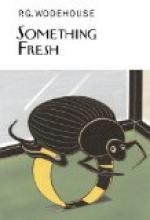“And in any case, Miss Simpson,” he said solemnly, “with things come to the pass they have come to, and the juries—drawn from the lower classes—in the nasty mood they’re in, it don’t seem hardly necessary in these affairs for there to have been any definite promise of marriage. What with all this socialism rampant, they seem so happy at the idea of being able to do one of us an injury that they give heavy damages without it. A few ardent expressions, and that’s enough for them. You recollect the Havant case, and when young Lord Mount Anville was sued? What it comes to is that anarchy is getting the upper hand, and the lower classes are getting above themselves. It’s all these here cheap newspapers that does it. They tempt the lower classes to get above themselves.
“Only this morning I had to speak severe to that young fellow, James, the footman. He was a good young fellow once and did his work well, and had a proper respect for people; but now he’s gone all to pieces. And why? Because six months ago he had the rheumatism, and had the audacity to send his picture and a testimonial, saying that it had cured him of awful agonies, to Walkinshaw’s Supreme Ointment, and they printed it in half a dozen papers; and it has been the ruin of James. He has got above himself and don’t care for nobody.”
“Well, all I can say is,” resumed Judson, “that I hope to goodness nothing won’t happen to Freddie of that kind; for it’s not every girl that would have him.”
There was a murmur of assent to this truth.
“Now your Miss Peters,” said Judson tolerantly—“she seems a nice little thing.”
“She would be pleased to hear you say so,” said Joan.
“Joan Valentine!” cried Judson, bringing his hands down on the tablecloth with a bang. “I’ve just remembered it. That was the name of the girl Freddie used to write the letters and poems to; and that’s who it is I’ve been trying all along to think you reminded me of, Miss Simpson. You’re the living image of Freddie’s Miss Joan Valentine.”
Ashe was not normally a young man of particularly ready wit; but on this occasion it may have been that the shock of this revelation, added to the fact that something must be done speedily if Joan’s discomposure was not to become obvious to all present, quickened his intelligence. Joan, usually so sure of herself, so ready of resource, had gone temporarily to pieces. She was quite white, and her eyes met Ashe’s with almost a hunted expression.
If the attention of the company was to be diverted, something drastic must be done. A mere verbal attempt to change the conversation would be useless. Inspiration descended on Ashe.
In the days of his childhood in Hayling, Massachusetts, he had played truant from Sunday school again and again in order to frequent the society of one Eddie Waffles, the official bad boy of the locality. It was not so much Eddie’s charm of conversation which had attracted him—though that had been great—as the fact that Eddie, among his other accomplishments, could give a lifelike imitation of two cats fighting in a back yard; and Ashe felt that he could never be happy until he had acquired this gift from the master.




